The Green Party of the United States (GPUS) is a federation of Green state political parties in the United States. The party promotes green politics, specifically environmentalism; nonviolence; social justice; participatory democracy; grassroots democracy; anti-war; anti-racism; libertarian socialism and eco-socialism. On the political spectrum, the party is generally seen as left-wing. As of 2022, it is the fourth-largest political party in the United States by voter registration, behind the Libertarian Party.

The Legislative Yuan is the unicameral legislature of Taiwan located in Taipei. The Legislative Yuan is composed of 113 members, who are directly elected for four-year terms by people of the Taiwan Area through a parallel voting system.
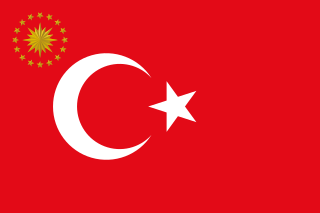
The president of Turkey, officially the president of the Republic of Türkiye, is the head of state and head of government of Turkey. The president directs the executive branch of the national government and is the commander-in-chief of the Turkish military. The president also heads the National Security Council.

The president of South Africa is the head of state and head of government of the Republic of South Africa. The president directs the executive branch of the federal government and is the commander-in-chief of the South African National Defence Force. Between 1961 and 1994, the office of head of state was the state presidency.

Haradanahalli Doddegowda Deve Gowda is an Indian politician who served as the 11th prime minister of India from 1 June 1996 to 21 April 1997. He was previously the 14th Chief Minister of Karnataka from 1994 to 1996. He presently is a Member of Parliament in the Rajya Sabha representing Karnataka. He is the national president of the Janata Dal (Secular) party. Born in a farming family, he joined the Indian National Congress party in 1953, and remained a member until 1962. He was imprisoned during the Emergency. He became President of the state unit of Janata Dal in 1994, and was considered to be a driving force in the party's victory in Karnataka. He served as the 8th Chief Minister of Karnataka from 1994 to 1996. In the 1996 general elections, no party won enough seats to form a government. When the United Front, a coalition of regional parties, formed the central government with the support of the Congress, Deve Gowda was unexpectedly chosen to head the government and was elected Prime Minister. During his tenure as prime minister, he also served as Home Minister for some time. His prime ministerial tenure lasted for less than a year. After his prime ministerial tenure, he was elected to the 12th (1998), 14th (2004), 15th, and 16th Lok Sabha, as Member of Parliament for the Hassan Lok Sabha constituency. He lost Lok Sabha elections in 2019 from Tumkuru but has been elected to Rajya Sabha since.
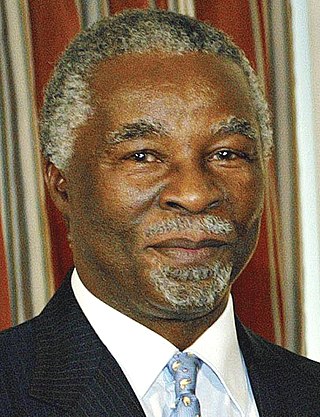
General elections were held in South Africa on 2 June 1999. The result was a landslide victory for the governing African National Congress (ANC), which gained fourteen seats. Incumbent president Nelson Mandela declined to seek re-election as president on grounds of his age. This election was notable for the sharp decline of the New National Party, previously the National Party (NP), which without former State President F.W. de Klerk lost more than half of their former support base. The liberal Democratic Party became the largest opposition party, after being the fifth largest party in the previous elections in 1994. The number of parties represented in the National Assembly increased to thirteen, with the United Democratic Movement, jointly headed by former National Party member Roelf Meyer, and former ANC member Bantu Holomisa, being the most successful of the newcomers with fourteen seats.
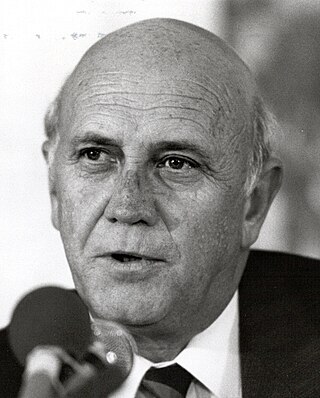
General elections were held in South Africa between 26 and 29 April 1994. The elections were the first in which citizens of all races were allowed to take part, and were therefore also the first held with universal suffrage. The election was conducted under the direction of the Independent Electoral Commission (IEC), and marked the culmination of the four-year process that ended apartheid.
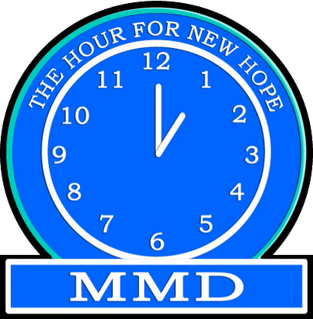
The Movement for Multi-party Democracy (MMD) also known as New Hope MMD is a political party in Zambia. Originally formed to oust the previous government, MMD controlled an absolute majority in parliament between 1991 and 2001, when its past leader, Frederick Chiluba was President of Zambia. Its election into power in 1991 ended the 27-year rule of President Kenneth Kaunda and his United National Independence Party (UNIP). It remained the dominant party within Zambian politics until the general elections of September 2011.
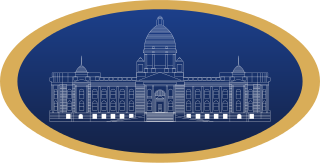
The National Assembly is the unicameral legislature of Serbia. The assembly is composed of 250 deputies who are proportionally elected to four-year terms by secret ballot. The assembly elects a president (speaker) who presides over the sessions.
An indirect election or hierarchical voting is an election in which voters do not choose directly among candidates or parties for an office, but elect people who in turn choose candidates or parties. It is one of the oldest forms of elections and is used by many countries for heads of state, cabinets, heads of government, and/or upper houses. It is also used for some supranational legislatures.
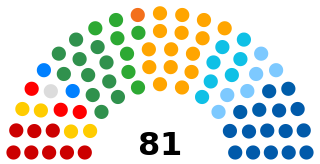
The National Congress of Brazil is the legislative body of Brazil's federal government. Unlike the state legislative assemblies and municipal chambers, the Congress is bicameral, composed of the Federal Senate and the Chamber of Deputies. The Congress meets annually in Brasília from 2 February to 22 December, with a mid-term break taking place between 17 July and 1 August.

Elections in Portugal are free, fair, and regularly held, in accordance with election law.
Elections in the Philippines are of several types. The president, vice-president, and the senators are elected for a six-year term, while the members of the House of Representatives, governors, vice-governors, members of the Sangguniang Panlalawigan, mayors, vice-mayors, members of the Sangguniang Panlungsod/members of the Sangguniang Bayan, barangay officials, and the members of the Sangguniang Kabataan are elected to serve for a three-year term.

Elections in Zambia take place within the framework of a multi-party democracy and a presidential system. The President and National Assembly are simultaneously elected for five-year terms.

The National Democratic Congress (NDC) is a social democratic political party in Ghana, founded by Jerry Rawlings, who was Head of State of Ghana from 1981 to 1993 and the President of Ghana from 1993 to 2001. Following the formation of the Provisional National Defence Council (PNDC), which ruled Ghana following the military coup d'état on 31 December 1981, there was pressure from the international community to restore democracy. The NDC was formed as the ruling party ahead of elections in 1992, in which Rawlings was elected president, and in 1996 Rawlings was re-elected as the NDC candidate. Rawlings' second term ended in 2001.
An independent or non-partisan politician is a politician not affiliated with any political party or bureaucratic association. There are numerous reasons why someone may stand for office as an independent.

The election of the president and the vice president of the United States is an indirect election in which citizens of the United States who are registered to vote in one of the fifty U.S. states or in Washington, D.C., cast ballots not directly for those offices, but instead for members of the Electoral College. These electors then cast direct votes, known as electoral votes, for president, and for vice president. The candidate who receives an absolute majority of electoral votes is then elected to that office. If no candidate receives an absolute majority of the votes for president, the House of Representatives elects the president; likewise if no one receives an absolute majority of the votes for vice president, then the Senate elects the vice president.
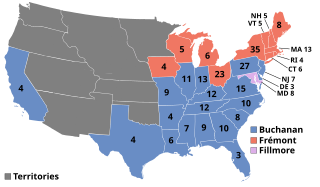
The 1856 United States elections elected the members of the 35th United States Congress and the President to serve from 1857 until 1861. The elections took place during a major national debate over slavery, with the issue of "Bleeding Kansas" taking center stage. Along with the 1854 elections, these elections occurred during the transitional period immediately preceding the Third Party System. Old party lines were broken; new party alignments along sectional lines were in the process of formation. The Republican Party absorbed the Northern anti-slavery representatives who had been elected in 1854 under the "Opposition Party" ticket as the second-most powerful party in Congress. Minnesota and Oregon joined the union before the next election, and elected their respective Congressional delegations to the 35th Congress.
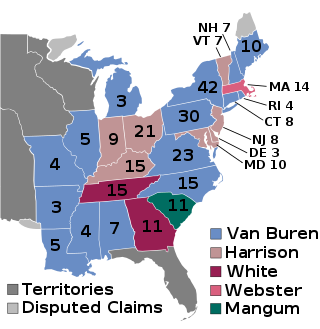
The 1836 United States elections elected the members of the 25th United States Congress. The election saw the emergence of the Whig Party, which succeeded the National Republican Party in the Second Party System as the primary opposition to the Democratic Party. The Whigs chose their name in symbolic defiance to the leader of the Democratic Party, "King" Andrew Jackson, and supported a national bank and the American System. Despite the emergence of the Whigs as a durable political party, Democrats retained the presidency and a majority in both houses of Congress.



















